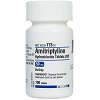 Pill Categories
Pill Categories
Amitriptyline
 |
Amitriptyline is a psychoactive tricyclic antidepressant drug that increases the activity serotonin and norepinephrine in the brain thereby improving the mood of the person. |
PRODUCT DESCRIPTION, SAFETY, ETC
Amitriptyline 100 mg
Amitriptyline 50 mg
Amitriptyline 25 mg
| Package | Price | Per pill | Save | Order |
|---|---|---|---|---|
| 360 pills - 25 mg | ₣92.68 | ₣0.25 | ₣36.31 |  |
| 270 pills - 25 mg | ₣75.41 | ₣0.28 | ₣21.33 |  |
| 180 pills - 25 mg | ₣54.03 | ₣0.30 | ₣10.47 |  |
| 90 pills - 25 mg | ₣32.25 | ₣0.36 | — |  |

PRODUCT DESCRIPTION
Drug Title
Amitriptyline
Drug Uses
Amitriptyline is commonly prescribed as an anti-depressant and is used for the treatment of major depression. However, it may also be used for the treatment of other conditions as determined by your doctor.
Usage
Amitriptyline needs to be consumed orally about 1-4 times daily with or without a meal. You must avoid taking grapefruit while taking Amitriptyline.
It may take up to 30 days for you to control the symptoms of depression and it is recommended that you continue to use it for the full course of treatment even if you feel well in a few days.
Drug Class and Mechanism
Amitriptyline is a psychoactive tricyclic antidepressant drug. The exact method of its functioning is not known. However, it increases the activity of certain chemicals in the brain which helps in improving the mood.
Missed Dosage
If you have missed a dose of Amitriptyline, then it is recommended that you skip the existing dose and continue with your regular dosage. Please do not take a double dose.
Storage
Store it at room temperature (between 59 and 86 degrees F (15 and 30 degrees C) in an air tight container protecting it from direct exposure to light, heat and moisture. Keep away from pets and children.
Safety Information
Discuss with your doctor about any prior medical condition that you may have including glaucoma, an irregular heartbeat, heart disease, chest pain, liver disease, prostate problems, thyroid disease, or are unable to urinate (urinary retention), history of seizures, epilepsy, or porphyria, have allergies to medicines, foods, or other substances.
You must not take Amaryl if you are taking antihistamines (e.g., diphenhydramine), cisapride, droperidol, a ketolide (e.g., telithromycin) , a macrolide (e.g., erythromycin), mibefradil, or pimozidere allergic to any ingredient in Amitriptyline, are recovering from a heart attack, are currently taking or have taken a monoamine oxidase inhibitor (MAOI) (e.g., phenelzine, selegiline) within the last 14 days.
Certain drugs can interact with Amaryl and hence, mention clearly to your doctor or pharmacist all medicines, dietary supplements and herbal prescriptions that you are taking, especially any of the following.
• MAOIs (eg, phenelzine, selegiline) because they can cause serious, sometimes life-threatening, reactions. Do NOT take MAO inhibitors with, or within 2 weeks of taking, Amitriptyline
• Anticholinergics (eg, scopolamine), bupropion, cimetidine, fluconazole, phenothiazines (eg, chlorpromazine), SSRIs (eg, fluoxetine), terbinafine, or valproic acid because side effects such as blurred vision, difficult urination, drowsiness or sedation, dry mouth, or lightheadedness may occur
• Antihistamines (eg, diphenhydramine), cisapride, droperidol, ketolides (eg, telithromycin), macrolides (eg, erythromycin), mibefradil, pimozide, or streptogramins (eg, quinupristin/dalfopristin) because serious side effects on the heart (eg, racing heartbeat, dizziness, fainting, life-threatening abnormal heartbeat leading to unconsciousness, and lack of heartbeat, may be increased by Amitriptyline
• Carbamazepine, thyroid medicines (eg, levothyroxine), or stimulants (eg, albuterol, pseudoephedrine) because their side effects may be increased by Amitriptyline
• Warfarin because side effects such as serious bleeding may be increased by Amitriptyline
• Clonidine, guanethidine, or guanfacine because the effectiveness of these medicines may be decreased
Side Effects
Some of the common side effects of Amitriptyline are lack of libido, constipation, vision problems (blurred), nausea, trouble sleeping, tiredness, weakness, loss of appetite, headache, dry mouth and dizziness. You may seek medical care if these symptoms persist or become bothersome.
Other severe side effects include allergic reactions (rash, hives, itching, difficulty breathing, tightness in the chest, swelling of the mouth, face, lips, or tongue), new or worsening agitation, anxiety, panic attacks, chest pain, difficulty swallowing, fainting, fever or sore throat, hoarseness, slurred speech; suicidal thoughts or actions, irregular or slow heartbeat, shortness of breath, stomach pain or tenderness, unusual tiredness or weakness, yellowing of the skin or eyes, one-sided weakness, seizures, severe or persistent dizziness or headache, unusual or severe mental or mood changes; vision problems; yellowing of the skin or eyes.
You must seek medical attention immediately if any of these side effect occur.
| Home Contact us Delivery Control Discounts Sitemap | Terms of service | Money back policy | Privacy policy |








 Live Chat 24/7
Live Chat 24/7





